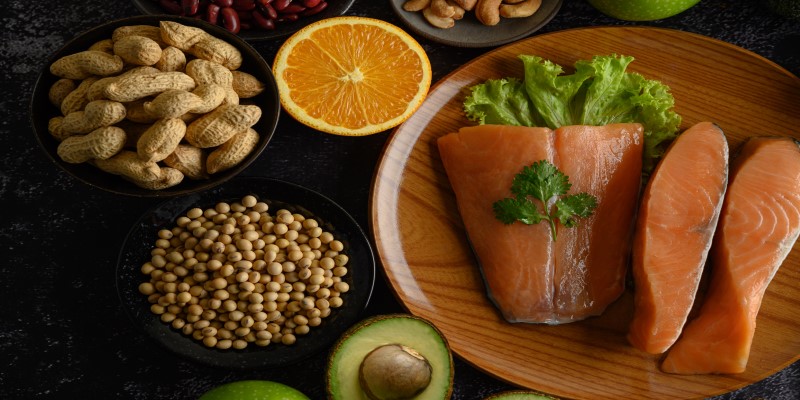Advertisement
Migraine Diet: 9 Dos and Don’ts for Effective Headache Relief
Sep 15, 2024 By Kristina Cappetta
Dealing with migraines can feel like navigating a maze with no clear exit. While many factors contribute to these intense headaches, one often overlooked aspect is diet. What you eator dont eatcan significantly impact the frequency and severity of your migraines. If you've ever wondered how changing your diet might offer relief, you're not alone.
A thoughtful approach to your eating habits can help identify and avoid triggers, potentially easing your discomfort. In this guide, we'll discuss 9 crucial dos and don'ts of a migraine-friendly diet and give you practical tips for managing your migraines more effectively.
Migraine Diet Guide: 9 Things You Should and Shouldnt Eat
Navigating a diet that helps manage migraines can be challenging, but the right choices can make a significant difference. What you consume might be influencing your migraine frequency and severity more than you realize.
This guide will explore 9 essential dietary dos and donts to help you understand how specific foods affect your migraines. By learning which foods to embrace and which to avoid, you can make informed choices that could lead to fewer migraine attacks and a better quality of life.
Do Eat Regular Meals
Skipping meals or fasting can trigger migraines for many people. It's important to maintain a regular eating schedule to keep your blood sugar levels stable. Low blood sugar can be a major trigger for migraines, so make sure to eat balanced meals at consistent times throughout the day. If youre on the go, keep healthy snacks like nuts, yogurt, or fruit handy to avoid long gaps between meals.
Dont Consume Too Much Caffeine

Caffeine can be a double-edged sword when it comes to migraines. For some, a small amount of caffeine can actually help alleviate headache symptoms. However, consuming too much caffeine or having it inconsistently can lead to withdrawal headaches and trigger migraines. Aim to keep your caffeine intake moderate and steady, and try to avoid it late in the day to prevent sleep disturbances, which can also lead to headaches.
Do Stay Hydrated
Dehydration is a common yet often overlooked migraine trigger. Drinking enough water throughout the day is essential for keeping your body balanced and preventing headaches. Aim for at least eight glasses of water a day, and more if youre active or in a hot climate. Herbal teas and water-rich foods like cucumbers and watermelon can also contribute to your daily hydration needs.
Dont Overdo Processed Foods
Processed foods often contain additives like nitrates, MSG (monosodium glutamate), and artificial sweeteners that can trigger migraines in susceptible individuals. Common culprits include cured meats, packaged snacks, and instant noodles. Instead, focus on fresh, whole foods like fruits, vegetables, lean proteins, and whole grains. Reading food labels carefully can help you identify and avoid these hidden triggers.
Do Include Magnesium-Rich Foods
Magnesium deficiency has been linked to migraines, and many people do not get enough of this essential mineral in their diet. Foods rich in magnesium, such as leafy greens, nuts, seeds, and whole grains, can help reduce the frequency of migraines for some individuals. You can also consider magnesium supplements, but its always best to consult with a healthcare provider before starting any new supplement regimen.
Dont Skip Out on Sleep-Friendly Foods
Sleep plays a crucial role in migraine management, and your diet can impact the quality of your rest. Consuming foods that promote good sleep can help reduce migraine frequency, as poor sleep is a common trigger. Avoid heavy, spicy, or acidic meals before bed, as these can cause indigestion and disrupt sleep. Instead, focus on sleep-friendly options like bananas, almonds, and chamomile tea, which contain nutrients that promote relaxation. Creating a calming bedtime routine that includes mindful eating habits can contribute to better sleep and fewer migraines.
Do Eat Foods Rich in Omega-3s

Omega-3 fatty acids, found in foods like salmon, chia seeds, and flaxseeds, have anti-inflammatory properties that may help reduce the frequency and severity of migraines. Incorporating these healthy fats into your diet can be beneficial not just for headache relief, but also for overall brain health. Try adding a couple of servings of oily fish to your weekly meal plan or sprinkle flaxseed on your morning oatmeal.
Dont Ignore Food Sensitivities
Certain foods can trigger migraines in sensitive individuals, and its not always the same for everyone. Common triggers include aged cheeses, chocolate, and foods high in tyramine, like fermented products. If you suspect a food is triggering your migraines, try keeping a food diary to track what you eat and how it correlates with your headache patterns. Identifying and avoiding specific trigger foods can make a big difference in managing your migraines.
Do Focus on Balanced Nutrition
Focusing on balanced nutrition is essential for managing migraines and supporting overall health. A diet rich in a variety of nutrients helps maintain stable energy levels, supports brain function, and reduces inflammation. Incorporate a wide range of fruits, vegetables, lean proteins, whole grains, and healthy fats into your meals.
Foods high in antioxidants, such as berries and leafy greens, can help combat oxidative stress and inflammation, which are linked to migraine triggers. Additionally, a well-rounded diet ensures you get essential vitamins and minerals that play a crucial role in neurological health, potentially reducing the frequency and severity of migraine attacks.
Conclusion
Managing migraines through diet is a proactive way to take control of your health. By following these dos and donts, you can identify potential food triggers and make adjustments that work for your body. Remember, what works for one person might not work for another, so its important to listen to your body and make changes gradually.
Keeping a food diary, staying hydrated, and prioritizing balanced nutrition are key steps in managing migraines more effectively. With patience and careful observation, you can find a diet that supports your journey toward fewer headaches and a healthier, more comfortable life.







